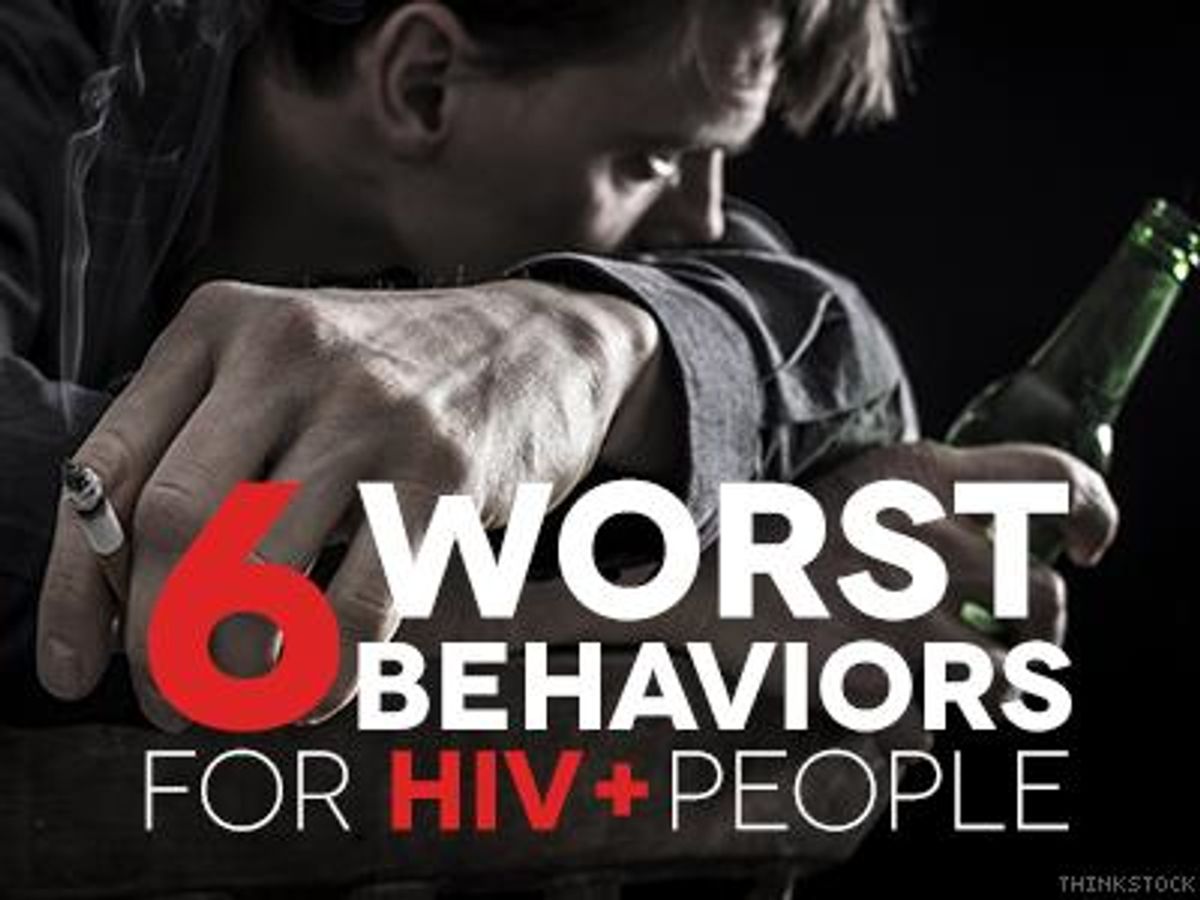HIV
6 Bad Behaviors for HIV-Positive People
6 Bad Behaviors for HIV-Positive People

You can still live a long life with HIV, but it comes with some complications.
Tyler Curry
March 28 2015 6:00 AM EST
July 23 2019 3:22 AM EST
By continuing to use our site, you agree to our Private Policy and Terms of Use.
6 Bad Behaviors for HIV-Positive People

People with HIV can live a long and happy life with the help of effective treatment and a healthy lifestyle. In fact, the Centers for Disease Control and Prevention reports that a person who is diagnosed in their 20s will have roughly the same lifespan as an HIV-negative person.
But that doesn't mean that there aren't several life-threatening complications that can come with the virus. An HIV-positive person is at a higher risk for health complications and must manage their health so that these risks don't become a reality. Here are a few of the biggest, baddest culprits when it comes to keeping your positive self healthy:
Smoking
Smoking cigarettes is the biggest health risk for a person living with HIV. According to the CDC, 40 percent of HIV-positive people are smokers, which is almost double the amount of the general population. What's more, a recent article on Medscape reported that people living with HIV are less likely to quit smoking than the general population.
Smoking greatly reduces the benefits of antiretroviral treatment, and increases the risk of cancer and cardiovascular diseases. People with HIV can reduce their life expectancy by more than a decade if they smoke, and can be subjected to four times the risk of death compared to non-smoking people living with HIV. Conversely, quitting smoking can greatly improve a positive person's health and their longevity.
Lack of Exercise
An HIV-positive person faces higher levels of heart inflammation, which leads to a greater risk of heart attacks and other cardiovascular diseases. In fact, recent studies indicate that a person living with the virus can face twice the risk of heart attacks and strokes as an HIV-negative person.
A sedentary lifestyle can increase your risks, too. Cardiovascular exercise is the best way to combat these risks and reduce heart inflammation without the use of medication. But make sure not to overdo your cardio exercise -- too much cardio activity can actually increase inflammation. A good amount of cardio consists of about 30 to 45 minutes of physical activities such as walking, swimming, or biking about five times a week.
Heavy Drinking and Binge Drinking
According to a report in the Journal of Acquired Immune Deficiency Syndromes, HIV-positive men who are heavy drinkers are at a much greater risk for cardiovascular disease. Heavy drinking can also lead to infrequent adherence to treatment, and an increased risk for liver disease and HIV progression.
According to the report, heavy drinking is defined by the consumption of more than 14 alcoholic beverages in one week, while binge drinking is defined as the consumption of more than six drinks in a single session. Reducing the amount of alcohol an HIV-positive person consumes can greatly reduce the health risks associated with HIV.
Condomless Sex
If a person contracts HIV, they may no longer think that safe sex is a high priority, especially if their sexual partner is also HIV-positive. But HIV-positive people are still susceptible to contracting other sexually transmitted infections that could increase the risk of life-threatening complications.
A co-infection of HIV and Hepatitis A, B, or C can compound the risks of liver disease. When HIV weakens your immune system, it can result in higher levels of HCV in your blood.
If you are HIV-positive, you need to protect your sexual health as much as anyone else.
A High-Cholesterol Diet
Many people living with HIV have lower levels of HDL, or good cholesterol, and higher triglyceride levels, which can increase a person's likelihood for artery problems. Both high cholesterol and HIV increase a person's risk for cardiovascular disease, so it is essential for HIV-positive people to maintain a good diet and avoid having too many high-cholesterol foods. For tips on what types of food to avoid, visit here.
Living in Denial
Refusing to come to terms with your diagnosis -- living in denial -- might be one of the hardest risks to quantify, but it's a serious one. Some who find out that they are living with HIV would rather face health risks than take the steps to get the proper medical and psychological care. A large part of HIV treatment is the mental and emotional support required to encourage a person to value their worth and actively manage their health.
An HIV diagnosis does not have to stop you from living your best life. But it's up to you to take control of your own health and reduce your chances of HIV-related complications. If you are HIV-positive, get treatment and the support you need to make the right choices and changes -- so that you can live the life you deserve.